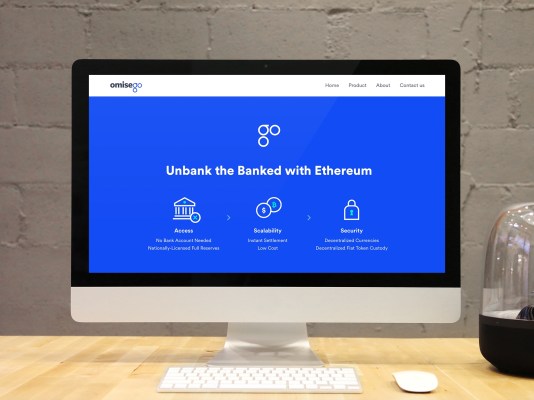The tech industry is opening its eyes to the possibilities of raising money using cryptocurrencies like bitcoin and Ethereum through ‘initial coin offerings,’ and it’s about to see the first ICO from a major venture-backed company.
Last week, Kik, a messaging app popular with young people in North America, announced an ambitious plan to launch its own currency as a basis for a developer community. Kik has raised over $120 million from investors to date and it claims 300 million registered users, making it the most established company to throw its hat in the ICO ring thus far, but it is about to be beaten to the punch by Omise, a Thailand-based company that provides Stripe-like payment features in Japan and Southeast Asia.
Four-year-old Omise has raised $20 million from investors, including SBI, Sinar Mas and Ascend Group, but now it is turning to cryptocurrencies and the blockchain for its next move. The company is looking to raise up to $19 million through the sale of its own coin — OMG, short for Omise Go — which will be used to power a network that lets users transfer money and make payments without the need for a bank account or high service fees.
The core aim is to encourage financial inclusion in emerging markets by creating a platform that other companies beyond Omise can use.
Bloomberg previously reported on Omise’s desire to hold an ICO. Omise declined to provide a specific date for the event, but sources close to the company told TechCrunch it is on course to hold a token sale on June 7.
Under proposed terms, 65 percent of all coins will be released during the sale. A further 20 percent will be retained by Omise for future costs and expenses with 10 percent left for the company’s team. The remaining five percent is set aside for “airdropping,” which essentially means that small amounts will be given to people who already own Ethereum’s Ether coin to stoke interest and widen engagement.
The company isn’t planning to make another token sale in the future, representatives told TechCrunch, in order to prevent dilution.
ICOs, or token sales, have to date proven popular with blockchain- and bitcoin-focused companies, but the appeal and possibilities are beginning to spark interest among more mainstream businesses in the tech domain. CNBC recently reported that ICOs have raised $180 million this year, compared to $101 million in all of last year.
Cloud services firm Storj is generally agreed to be one of the more successful initial coin offerings to date having raised $30 million from its Storjcoin thus far. Digital identity platform Civic is planning an offering that could top that, according to CNBC, but neither has raised anything like the capital from traditional VCs as Kik or Omise.
Kik’s plan for its coin — which will be called Kin — is focused around enabling a developer ecosystem that isn’t reliant on advertising. It’s a major play against existing systems like Facebook, and therefore bold and risky. Omise, meanwhile, is taking a more conventional path with its plan to develop a wholly decentralized payment platform — Omise Go.
The company, which serves business customers in Japan, Thailand and Indonesia, currently operates as a payment enabler that lets companies take money from customers online. That predominantly focuses on credit cards but, unlike larger global players such as Stripe, Omise offers support for alternative options such as paying over the counter at convenience stores. That’s because credit card and bank account penetration is substantially lower in emerging markets like Southeast Asia so alternatives are needed in order to cater to mass market consumers.
With Omise Go — and the “OMG” coin — Omise wants to remove even more of the boundaries by removing even the need to own a bank account. Omise plans to open-source its mobile wallet technology, and develop a decentralized payment system using the blockchain and OMG, which Ethereum’s ERC20 token standard. By decentralizing its network, Omise hopes to offer a more level playing field for fintech startups — providing services that exceed traditional credit card networks — and ultimately increase financial inclusion.
“The reason we chose blockchain technology is that we want to build a network that people can actually trust,” Omise co-founder Donnie Harinsut said in a video explaining the motivation behind the token offering.
“We want everyone to have access to financial services no matter who you are in society. It’s a fundamental right, not a privilege,” he added.
Beyond a fundraising event for the company, the ICO offers an opportunity for would-be investors to buy into the Omise Go network. OMG coin owners will be able to make money — like a dividend — by earning fees from validating transactions that occur on the Omise Go network. There’s also the potential to sell their coin should the value of it increase — that’s dependent on the network and success of the product.
This isn’t an overnight decision for Omise. The startup has invested in cryptocurrencies and the blockchain since 2015, that included providing a $100,000 grant for the Ethereum Foundation’s Devgrants program. It lists Ethereum creator Vitalik Buterin and Joseph Poon, the architect of bitcoin’s Lightning Network, among its advisors, and there are other ties, too. Wendell Davis, who was part of the original Ethereum founding team, is Omise’s product development lead while special advisor Thomas Greco has also served as an advisor to the Foundation.
Prior to its June ICO, Omise has published a technical whitepaper and a crowdsale document — think a pre-IPO prospectus, but for ICOs — to provide further color on its plans. There’s even a dedicated Slack channel where interested investors can ask questions and gather further information.
